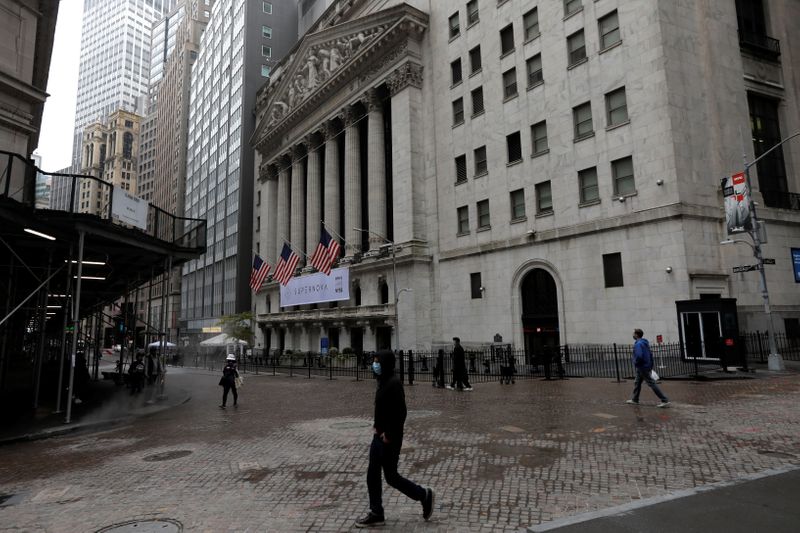NEW YORK (Reuters) – Some investors are betting the technology and communications stocks that drove a massive rebound in U.S. markets this year will face a tougher slog in coming months, no matter whether Republican President Donald Trump or Democratic challenger Joe Biden wins Tuesday’s election.
Betting against big technology has been a risky proposition over the last decade, as stocks like Amazon, Google and Netflix have shot higher at the expense of so-called value and cyclical stocks such as banks and energy companies.
Recently, however, some fund managers say they are growing alarmed by what they see as a consensus in Washington to tighten regulations, and prospects that another large stimulus bill would bolster a rotation out of tech and into other sectors including economically sensitive value stocks.
“There will be a shift and it is starting, but it will take time,” said Max Gokhman, head of asset allocation at Pacific Life Fund Advisors, which cut its exposure to large-cap tech in September to neutral from overweight.
Should Biden win as polls suggest, technology companies could face higher tax rates and tax-motivated selling as well as increased regulation, investors said.
Both Trump and Biden have criticized large tech companies but stopped short of explicitly calling for them to be broken up. Trump has said “there is something going on in terms of monopoly” when asked about big tech firms.
Apple Inc <AAPL.O>, Microsoft Corp <MSFT.O>, Amazon.com Inc <AMZN.O>, Facebook Inc <FB.O>, and Google-parent Alphabet Inc <GOOGL.O> now make up approximately 23% of the total weight of the S&P 500, according to S&P Dow Jones Indices, giving their gyrations an outsized impact on broader markets.
Hedge fund manager David Einhorn of Greenlight Capital, a longtime tech bear, told clients in a letter this week that tech stocks were in the middle of an “enormous bubble” that popped when the S&P 500 hit its record high on Sept. 2, 2020.
Technology stocks tumbled in the past week’s selloff, though earnings results from companies like Facebook, Alphabet and Amazon have shown how the tech giants expanded their businesses this year.
“It has become more difficult for mega-cap tech to surprise on the upside,” analysts at UBS Global Wealth Management said in a note Friday.
Some investors pointed to recent hearings in Washington as a sign that increased regulations will come to the sector no matter which party takes control in Washington.
The Justice Department’s lawsuit against Google in late October marked the first time the U.S. government has cracked down on a major tech company since it sued Microsoft Corp MSFT.O for anti-competitive practices in 1998.
“This may be the only bi-partisan issue out there,” Pacific Life’s Gokhman said.
An expected $2 trillion stimulus package by Biden, who leads Trump in national polls by 10 percentage points, could enhance the appeal of out-of-favor stocks like construction equipment and materials companies, investors said.
A shift to value stocks “is increasingly likely over the next 12 months,” said Eduardo Costa, who runs hedge fund Calixto Global Investors, LP.
Calixto, which invests largely in technology, media, and telecom stocks, has returned 30% since January, an investor said.
Potentially higher taxes under a Biden administration are another worry. Biden has proposed increasing the corporate tax rate to 28% from 21%, potentially weighing on companies’ earnings.
A separate proposal to tax capital gains and dividends as ordinary income could prompt some investors to sell winners in order to lock in lower tax rates, analysts said.
Brian Jacobsen, senior investment strategist at Wells Fargo Asset Management, said his firm has been underweighting the Nasdaq Composite and is moving more of its portfolios into cyclical stocks with more compelling valuations, especially industrials.
“We’ve done some scenario analysis and thinking through various permutations of who controls Congress and the White House and our general view is that it might not matter all that much,” he said.
(Reporting by David Randall and Svea Herbst-Bayliss; Editing by David Gregorio)
























